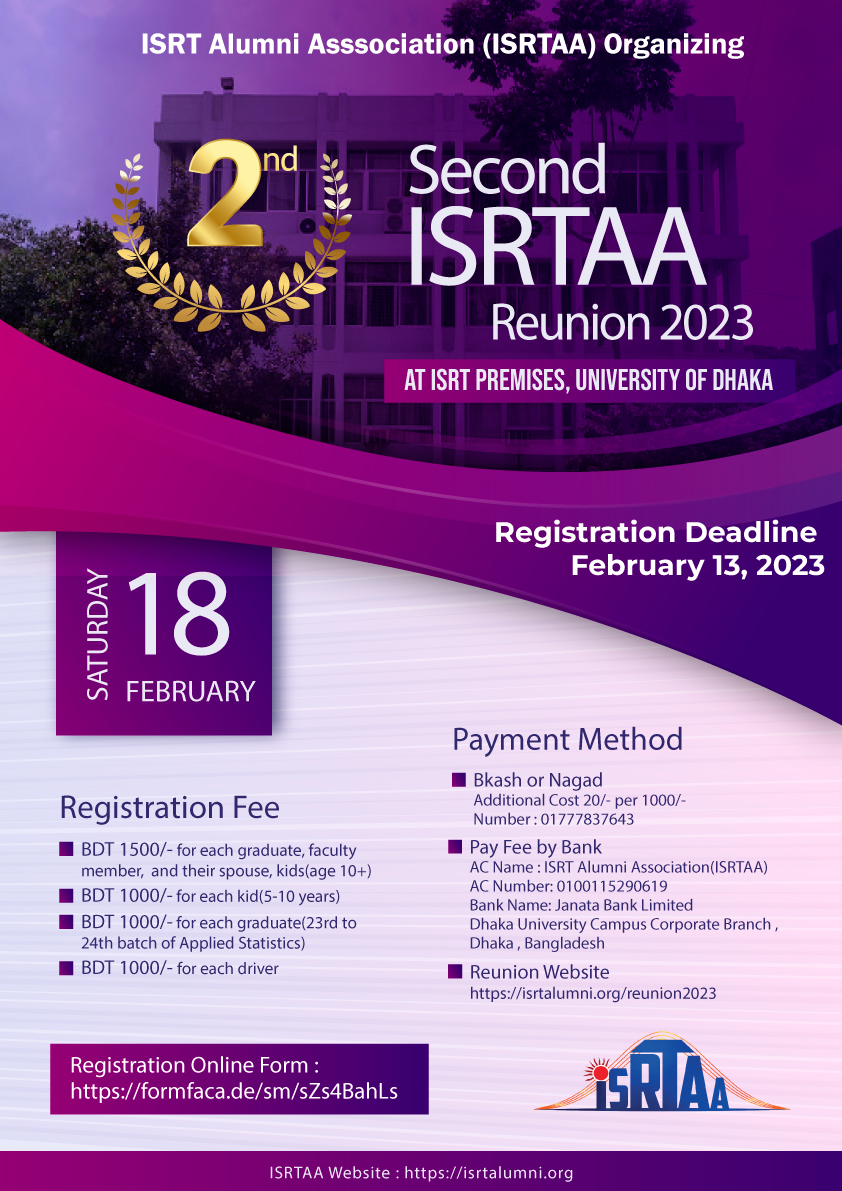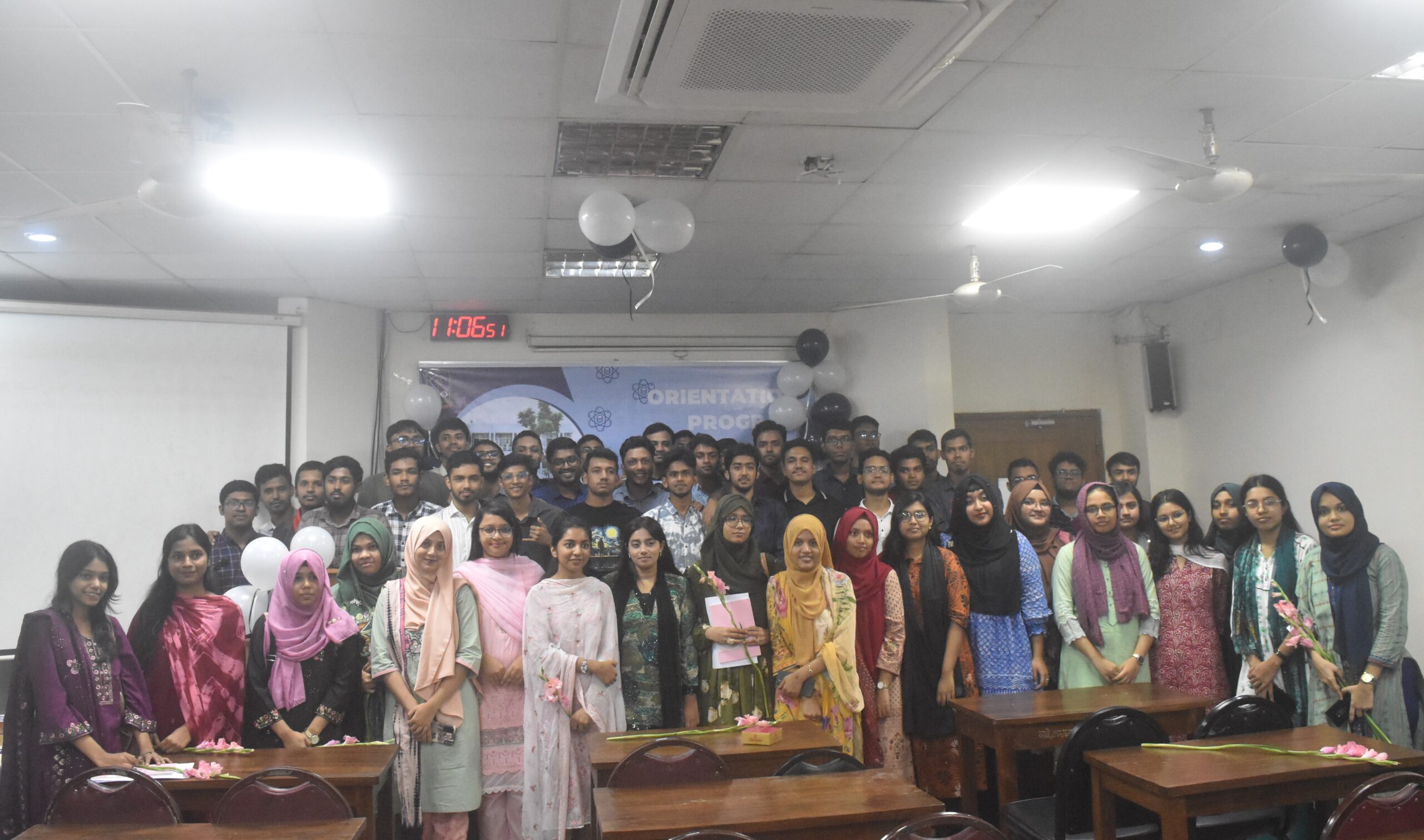Seminar on “Anomaly Detection in Temporal Networks through Topological Features and Motifs with Application to Mobility Data” at 2 pm on December 20, 2022
ISRT Seminar Room (3rd floor) Institute of Statistical Research and Training, University of Dhaka, Dhaka, Please Select, BangladeshSpeaker: Dr. Asim Kumer Dey, Brac University Venue: ISRT seminar room Date and time: 2 pm on Tuesday, 20 December 2022 Title: Anomaly Detection in Temporal Networks through Topological Features and Motifs with Application to Mobility Data Abstract: This paper aims to shed light on the potential relations among various higher-order network topological features and meso-level functionality of temporal
Inter-department Cricket Match against Pharmacy Department on 27 December 2022 (Tuesday) at 8.30 am
We are pleased to announce that the ISRT cricket team will play against the Department of Pharmacy on 27 December 2022 (Tuesday) at 8.30 am in the university's central playground.
Fresher Reception and Farewell on December 28, 2022
The freshers' Reception (28th batch) and Farewell (23rd batch) program will be held on Wednesday, Dec 28, 2022, at 10.00 am at the TSC auditorium. Honorable Pro-Vice Chancellor (Academic) Prof. Dr. A. S. M. Maksud Kamal has given kind consent to join us as chief guest, and the special guest of the event is Prof. Dr.
Applied Statistics Seminar on Tuesday, 10 January 2023 at 2 PM.
The speaker will be Argho Sarkar, a Ph.D. candidate at the University of Maryland, USA. He will give a talk on "Deep Learning for Climate Change: Challenges, Progress, and Possibilities." Besides presenting his research, Argho will also talk about his experiences as a graduate student at the University of Maryland. The seminar will take place in the
Applied Statistics Seminar on Tuesday (February 7, 2023) at 12 PM
Abstract: The exchangeability of units between treatment groups is a key and typically untestable assumption for evaluating causal intervention effects in observational studies. Standard methods assuming exchangeability can yield biased treatment effect estimates if the assumption does not hold. Existing methods evaluate the sensitivity of treatment effect estimates to non-exchangeability due to unmeasured confounders only.
ISRT Alumni (ISRTAA) Reunion 2023 is on 18 February, 2023
ISRT Alumni (ISRTAA) Reunion 2023 will occur on February 18, 2023, on ISRT premises. All graduates are encouraged to attend the event. Details of the reunion event can be found on the website https://isrtalumni.org/reunion2023 and the reunion registration site (http://isrtalumni.org/reunion2023/reunion-2023-registration).
Special Applied Statistics Seminar on “Health Statistics in Bangladesh”
Prof. Dr. Syed Abdul Hamid (https://ihe.ac.bd/faculty/syedabdulhamid), Health Institute, Dhaka University, will give a talk on "Health Statistics in Bangladesh" at ISRT on February 27, 2023, from 1.30-2.30 pm. He is an expert on Health Statistics. This talk is being arranged on the eve of National Statistics Day to be celebrated country-wide on February 27, 2023.
Workshop on Research Methodology and Scientific Publication at ISRT for M.S. Students
Details can be found at https://www.isrt.ac.bd/workshop Date and Time: Sunday, 19th March 2023, 2:00 p.m. - 4:30 p.m. Venue: Institute of Statistical Research and Training (ISRT) , Room # 303 Technical Support: AdSEARCH by icddr,b Co-ordinators: Ahmed Ehsanur Rahman, Associate Scientist, MCHD, icddr,b Anisuddin Ahmed, Assistant Scientist and Project Coordinator, MCHD, icddr,b Session I: Experimental Study Designs
Seminar on Classification and Clustering for RNA-seq data with variable selection
Speaker: Tanbin Rahman PhD, FDA, USA Title: Classification and Clustering for RNA-seq data with variable selection Abstract: Clustering and classification play an important role in identifying sub-types of complex diseases as well as building a predictive model in the field of medicine. In recent years, lowering of cost and high accuracy has made RNA-seq widely popular which
Applied Statistics Seminar on “Pairwise Accelerated Failure Time Models for Infectious Disease Transmission Within and Between Households”
isrt seminar roomAbstract: Pairwise survival analysis handles dependent happenings in infectious disease transmission data by analyzing failure times in ordered pairs of individuals. The contact interval in the pair ij is the time from the onset of infectiousness in i to infectious contact from i to j, where an infectious contact is sufficient to infect j if he







